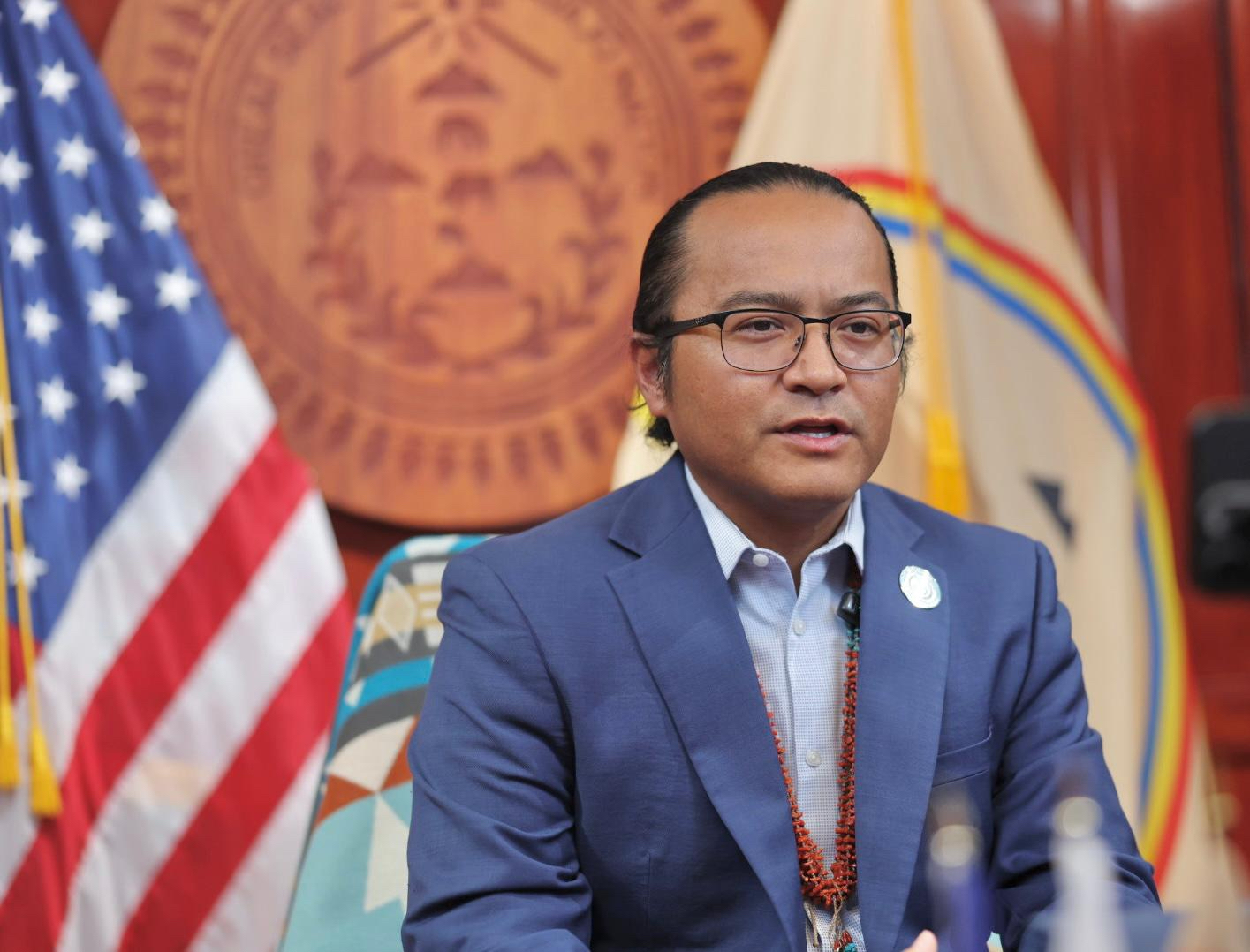
- Details
- By Native News Online Staff
Navajo Nation President Buu Nygren submitted his quarterly State of the Navajo Nation report to the Navajo Nation Council while attending a meeting at the White House to discuss the appointment of a new commissioner for the Office of Navajo Hopi Indian Relocation (ONHIR).
Joining President Nygren at the meeting were Navajo Hopi Land Commission Chairman Otto Tso and Vice Chairman Casey Allen Johnson. This marked the first time in 20 years that the Navajo Nation was invited to participate in discussions about the selection of an ONHIR commissioner.
"Today’s meeting is pivotal in our history," President Nygren told the Council. "It is the first time in more than two decades that the White House and ONHIR have granted us a seat at the table to discuss the future of a controversial program that has impacted the lives of countless Navajo families.”
ONHIR was established by the 1974 Navajo and Hopi Indian Land Settlement Act, known as the Relocation Act, to oversee the relocation of approximately 12,000 Navajos from land designated to the Hopi Tribe and around 100 Hopis from land designated to the Navajo Nation. The agency's responsibilities included determining eligibility for relocation benefits and building new homes. On February 25, 1991, the U.S. Controller reported that the original three-member commission, comprising Chairman Hawley Atkinson and members Ralph Watkins and Sandra Massetto, was replaced by a single commissioner under ONHIR.
“The White House now knows what we have known for years – our people need action and ONHIR needs a commissioner,” he said. “Our people need a commissioner who understands this issue and its history, who is fair, who will act impartially and who can bring justice to an unjust federal law 50 years after its enactment. I will do my best to see that the right person is appointed, and as soon as possible.”
In preparation for the meeting, the Navajo Nation Washington Office interviewed over 130 families to document their experiences and show the ongoing impact of the Relocation Act. "The White House now understands what we have known for years—our people need action, and ONHIR needs a commissioner," Nygren said. "We need someone who understands this issue, who is fair and impartial, and who can bring justice to an unjust law 50 years after its enactment."
“I support a request of $50 million to assist them,” the President said. “Through meaningful consultation, I know we can find a way to structure $50 million over a period of time to assist the relocatees.”
In his report, Nygren also paid tribute to Navajo Code Talker John Kinsel, Sr., who passed away peacefully at the age of 107. To honor Kinsel, one of the original 29 Code Talkers, flags across the Navajo Nation were ordered to be flown at half-staff from October 20 to October 27. Kinsel, born in 1917 in Cove, Arizona, served with the 9th Marine Regiment and the 3rd Marine Division. "He will not be forgotten," Nygren said. "We owe him a debt of gratitude for his bravery and dedication to the United States and the Navajo Nation."
Veterans Administration officials praised Kinsel's legacy, with Executive Director Bobbie Ann Baldwin commending his courage and Interim Deputy Director Olin Kieyoomia noting that the Navajo Nation lost "a treasure, a hero" who used the Navajo language to save lives and instill pride.
In his address, Nygren also addressed tensions with Vice President Richelle Montoya, stating that their relationship had deteriorated following her signing of a recall petition against him and earlier allegations she made of sexual harassment. Nygren denied the accusations and said he looked forward to the results of a special investigation. He assured the Council that while Montoya's duties had been reassigned for accountability, her statutory authority remained unchanged.
“That is exactly what I am doing here in order to get as much done for the Navajo people in the time I have,” he reported to the Council. “I have said that I will hold everyone in my Administration and Executive Branch accountable, including myself and the Vice President, and that is what I’ve done and what I am doing here.”
More Stories Like This
Native News Weekly (August 25, 2024): D.C. BriefsNavajo Nation Mourns the Passing of Former Vice President Rex Lee Jim
Deb Haaland Earns Endorsement From Communications Workers of America Local 7076
University Soccer Standout Leads by Example
Two Native Americans Named to Democratic Congressional Campaign Committee's“Red to Blue” Program
Help us defend tribal sovereignty.
At Native News Online, our mission is rooted in telling the stories that strengthen sovereignty and uplift Indigenous voices — not just at year’s end, but every single day.
Because of your generosity last year, we were able to keep our reporters on the ground in tribal communities, at national gatherings and in the halls of Congress — covering the issues that matter most to Indian Country: sovereignty, culture, education, health and economic opportunity.
That support sustained us through a tough year in 2025. Now, as we look to the year ahead, we need your help right now to ensure warrior journalism remains strong — reporting that defends tribal sovereignty, amplifies Native truth, and holds power accountable.
 The stakes couldn't be higher. Your support keeps Native voices heard, Native stories told and Native sovereignty defended.
The stakes couldn't be higher. Your support keeps Native voices heard, Native stories told and Native sovereignty defended.
Stand with Warrior Journalism today.
Levi Rickert (Potawatomi), Editor & Publisher


